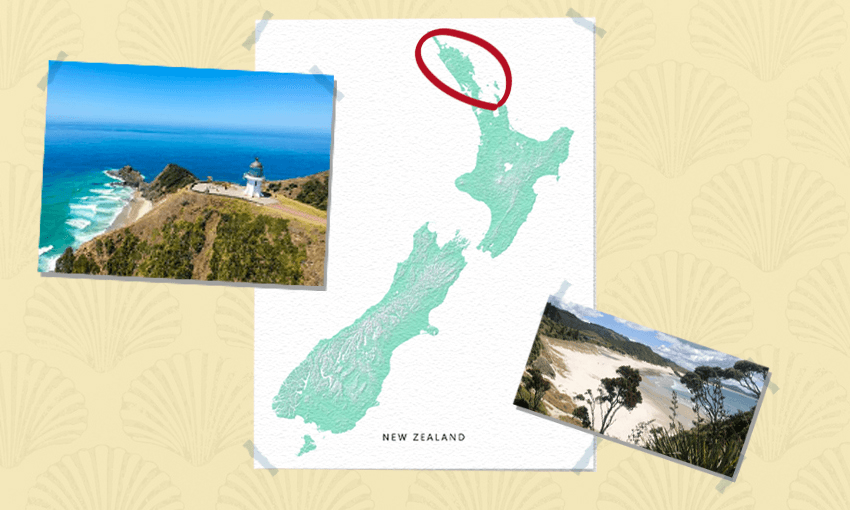From Te Rerenga Wairua at the top of the country, right down to Rakiura, we’re taking a look at our seven Māori electorates and the candidates contesting the seats. First up: the electorate of Te Tai Tokerau.
Te Tai Tokerau is our northern-most Māori electorate. Its boundary begins on the north side of the Auckland Harbour Bridge (including the western suburbs of Te Atatū South, Sunnyvale, Swanson and Waitakere City) and goes all the way up to Cape Reinga/Te Rerenga Wairua.
In the 2017 general election, 23,483 valid candidate votes were cast in the electorate. The Labour Party’s Kelvin Davis has held the Te Tai Tokerau seat for the last two terms. He narrowly beat Mana’s Hone Harawira in 2014 but won comfortably in 2017 with a 54% majority.
Labour also got 58.46% of the party vote in Te Tai Tokerau.
Seven people are contesting the seat in 2020. Incumbent Kelvin Davis will defend his seat against the Māori Party’s Mariameno Kapa-Kingi, Advance NZ’s Billy Te Kahika Jr, Maki Herbert of the Legalise Cannabis party, Janice Epiha of the One Party, New Conservative’s Daniel Shortland and independent candidate, Clinton Dearlove.
WATCH: The Māori seats: what are they and who cares about them?
Davis (Ngāpuhi, Ngāti Manu) says his priorities for Te Tai Tokerau are “jobs, housing, and health”.
“This government has recognised that the north has been neglected over many years, and we’ve invested well over half a billion dollars in this region, in economic development, tourism, health and infrastructure. I hope to be fortunate enough to continue advocating for Te Tai Tokerau,” Davis told The Spinoff.
“Layered over all of that is the Covid-19 reality we’re in, and doing everything possible to support our health, economic and social responses, and in particular, for me, to keep our communities in the north safe.”
It was the strength of the iwi Covid-19 response that galvanised Mariameno Kapa-Kingi (Te Aupōuri, Ngāti Kahu ki Whangaora) to stand for the Māori Party, along with a desire to see government subsidies end up with the kaupapa Māori organisations that need them. Considered Davis’s biggest competitor, Kapa-Kingi has worked in Māori housing and health services in Northland and elsewhere for more than 30 years. She’s also a fourth dan (rank) black belt in the martial art of aikido.
Oranga Tamariki reform is a priority going into the election for Kapa-Kingi. “Over the years, even with the inclusion of Māori models of engagement and practice and the increased Māori staff across all its offices, it’s still tackled the fundamental source if its dysfunction – its racist norm,” she told The Spinoff.
Mental health and suicide are areas she’s also passionate about. “Māori death by suicide is symptomatic of a number of things and deculturation is at the top of that list of things. Solutions for Māori are to be crafted and led by Māori mana motuhake.”
For Legalise Cannabis co-leader Maki Herbert, this is her fourth time contesting a Northland seat after she entered into two by-elections: in 2011 for Te Tai Tokerau following Hone Harawira’s resignation, and in 2015 for Northland following the resignation of Mike Sabin. She stood again in Te Tai Tokerau for the 2017 general election.
Herbert is a longtime advocate for medical marijuana, and has operated as a “green fairy” providing medicinal cannabis and advice to people with conditions such as chronic pain. She’s also worked with various kōhanga reo in the Hokianga region and as a volunteer officer with St Johns ambulance in Kohukohu.
Billy Te Kahika Jr, the son of legendary psych-rock musician Billy TK, is a first-time candidate standing for Advance NZ – the result of a merger between Te Kahika’s NZ Public Party and former National MP Jami-Lee Ross’s Advance NZ party. Ross is currently being investigated by the Serious Fraud Office in a fraud case over National Party donations.
Te Kahika has made headlines for agitating against the government’s Covid-19 response and sharing a number of conspiracies to his followers. Despite Māori public health researchers finding that Māori are more likely to die from Covid-19, he’s described it as a “winter flu equivalent virus” and said that it’ll “eventually destroy our democracy” in New Zealand. His anti-government stance has made him popular with Māori who feel let down by those in positions of power. Advance NZ’s policies are focused on an “overhaul” of democracy and distancing New Zealand from foreign powers such as China, the WHO and the UN. Te Kahika hasn’t announced any policies specifically for te ao Māori or his priorities for Te Tai Tokerau.
Janice Epiha of the One Party hopes to promote her Christian and taha Māori values. “My vision is to see the glory of God bless Ngapuhi-nui-tonu, its people, and heal their land,” she wrote for The Spinoff Policy. Her priorities are housing, methamphetamine and banning the use of 1080. She’s currently retired but has worked at Northland DHB, Ngāti Hine, Te Rūnanga o Whaingaroa and Ngā Whetu o te Wa Kaikohe.
Independent candidate Clinton Dearlove was a Mana Party candidate in Te Tai Tonga in 2011 and an independent in Te Tai Tokerau. He’s symbolically standing for Ngāpuhi Unite, a party which hopes to get enough support to register in its own right for the 2023 election.
There’s no information available about the other minor party candidate, New Conservative’s Daniel Shortland.
Currently, there are 36,676 people enrolled in Te Tai Tokerau for the 2020 general election, and turn out at the last election was 69.4%. This is the Māori electorate with the highest number of candidates, and the outcome is most definitely not assured.
